The Real History of the End of the World (38 page)
Read The Real History of the End of the World Online
Authors: Sharan Newman

BOOK: The Real History of the End of the World
10.49Mb size Format: txt, pdf, ePub
Actually, the fact that the magnetic poles wander has been known for several centuries. I just missed the memo. After reading in both scientific journals and books for general readers, I became convinced that serious paleogeologists and physicists don't understand why this happens. Those who write about this for nonscientists, on the other hand, seem to think that this flip will happen very soon, maybe by 2012, and that it will cause continents to break apart, migrating animals to get lost, and people to lose interest in sex.
Even though I can't understand much about variations in the molten iron core of the earth or lithospheric rotations, the tentative conclusions of scientists, with lots of graphs and experimental results, sound more convincing that unfootnoted warnings of doom.
In some studies, it appears that two prehistoric extinction events occurred just after a pole shift. Now, when geologists say that something happens rapidly, one has to consider the source. A shift can take between two and twenty thousand years. They also note that there was a lot of volcanic activity at those times. The question is, did the pole reversal cause the volcanoes?
9
9
The answer is, no one is certain. Magnetism is not well understood. The Ulysses project, which sent a satellite to the sun, discovered a great deal about how the sun's magnetic field works, including the fact that it has polar reversals every few years.
10
10
What scientists seem to agree on is that this reversal won't happen overnight or any time soon. So I'm not adding it to my panic list. But that leads to the next catastrophic prediction.
Â
4.
The sun will send a solar flare
that will destroy the world.
The sun will send a solar flare
that will destroy the world.
This seems to go along with the 2012 fear that, at the time, the sun will be at “solar maximum” and be emitting all sorts of radiation, coronal mass ejections, and cosmic rays. The proponents of this theory are under the impression that solar maximums are rare. They aren't. The last one I know of was in 2003. There may have been another since.
11
11
Since I keep missing them, I'm guessing that solar flares, although they can temporarily disrupt electronics, especially in airplanes, are not going to contribute to the end of the world.
SO, WHAT MIGHT WIPE OUT EVERYONE ON THE PLANET?The natural upheavals just listed are among many phenomena that have provided fodder for doomsday prophets and filmmakers. Some of them may happen, but no one knows when and there's little that can be done to prevent them in any case. But there are two things that might destroy the world that we can do something about.
This first is my childhood terror, all-out nuclear war. There's no sense in pretending that we could survive a mass exchange of the kind of bombs we have now. But that is something that is totally in the hands of the human race. If we wind up in a radiated nuclear winter, it will be our own fault.
The second is an ecological disaster. Recently, the majority of people on earth have become aware that we are living in a complicated interrelationship with everything else on earth and that we have spent the past couple of thousand years ignoring the consequences of our actions. There are no easy solutions to this. But again, unlike meteors, gamma ray bursts (
very
unlikely), volcanoes, and a magnetic flux, in this case we can at least try to put things right.
very
unlikely), volcanoes, and a magnetic flux, in this case we can at least try to put things right.
1
David M. Raup, “Large-Body Impact and Extinction in the Phanerozoic,”
Paleobiology
18, no. 1 (1992): 82.
David M. Raup, “Large-Body Impact and Extinction in the Phanerozoic,”
Paleobiology
18, no. 1 (1992): 82.
2
Gregory S. Paul, “Giant Meteor Impacts and Great Eruptions: Dinosaur Killers?,”
BioScience
39, no. 3 (1989): 164.
Gregory S. Paul, “Giant Meteor Impacts and Great Eruptions: Dinosaur Killers?,”
BioScience
39, no. 3 (1989): 164.
3
Gordon P. Easton et al., “Magma Beneath Yellowstone National Park,”
Science
new ser. 188, 4190 (1975): 787-796.
Gordon P. Easton et al., “Magma Beneath Yellowstone National Park,”
Science
new ser. 188, 4190 (1975): 787-796.
4
Calvin Miller et al., “(Potentially) Frequently Asked Questions about Supervolcanoes and Supereruptions,”
Elements
4, no. 1 (2008): 16.
Calvin Miller et al., “(Potentially) Frequently Asked Questions about Supervolcanoes and Supereruptions,”
Elements
4, no. 1 (2008): 16.
5
Charles Wicks Jr., Wayne Thatcher, and Daniel Dzuisin, “Migration of Fluids beneath Yellowstone Caldera Inferred from Satellite Radar Interferometry,”
Science
282 (1998): 458.
Charles Wicks Jr., Wayne Thatcher, and Daniel Dzuisin, “Migration of Fluids beneath Yellowstone Caldera Inferred from Satellite Radar Interferometry,”
Science
282 (1998): 458.
6
Stephen Sparks et al.,
Super-Eruptions, Global Effects and Future Threats
(London: Geological Society of London, 2005), 6. This is a report to the government and the public, clearly written, that answers many concerns about the topic. I recommend it. Available at
www.geolsoc.org.uk/index.html
. Accessed November 2009.
Stephen Sparks et al.,
Super-Eruptions, Global Effects and Future Threats
(London: Geological Society of London, 2005), 6. This is a report to the government and the public, clearly written, that answers many concerns about the topic. I recommend it. Available at
www.geolsoc.org.uk/index.html
. Accessed November 2009.
7
Sparks et al., 9.
Sparks et al., 9.
8
Sid Perkins, “North by Northwest: The Planet's Wandering Poles Help Reveal History of Earth and Humans,”
Science News
173 (2007): 392.
Sid Perkins, “North by Northwest: The Planet's Wandering Poles Help Reveal History of Earth and Humans,”
Science News
173 (2007): 392.
9
Vincent Courtillot and Jean Besse, “Magnetic Field Reversals, Polar Wander and Core-Mantle Coupling,”
Science
new ser. 237, no. 4819 (1987): 1145.
Vincent Courtillot and Jean Besse, “Magnetic Field Reversals, Polar Wander and Core-Mantle Coupling,”
Science
new ser. 237, no. 4819 (1987): 1145.
10
E. J. Smith et al., “The Sun and Heliosphere at Solar Maximum,”
Science
new ser. 302, no. 5648 (2003): 1165-1169.
E. J. Smith et al., “The Sun and Heliosphere at Solar Maximum,”
Science
new ser. 302, no. 5648 (2003): 1165-1169.
11
Ibid., 1167.
Ibid., 1167.
WHEN WILL THE WORLD END?
PREDICTIONS THROUGH TIME
PREDICTIONS THROUGH TIME
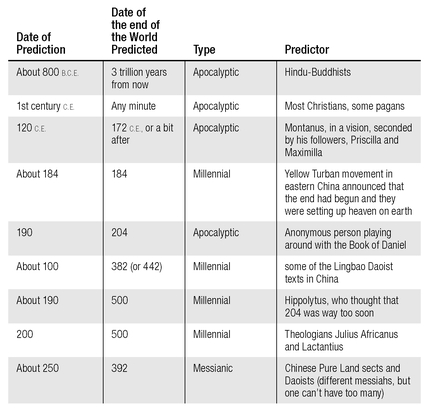
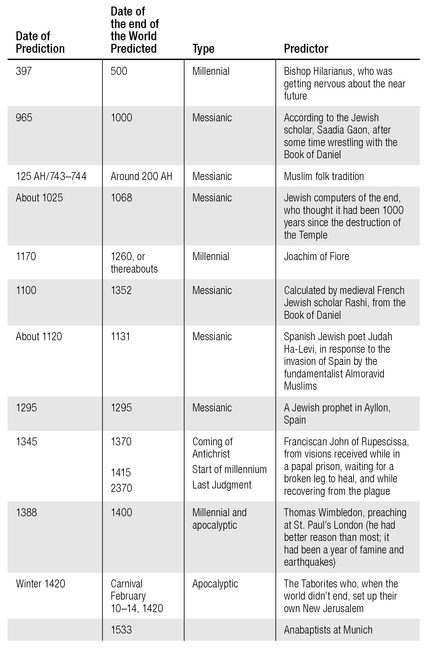
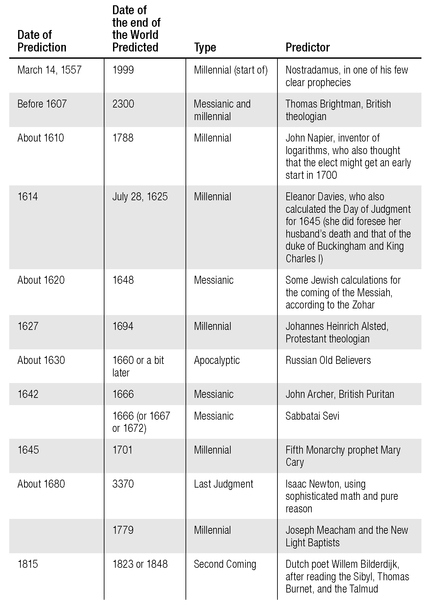
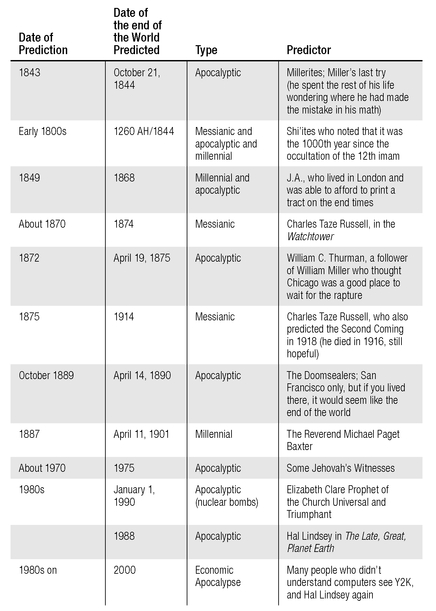
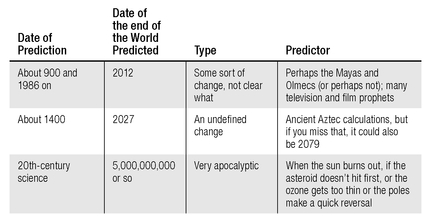
CHAPTER FORTY-THREE
The End of the End
Â
Â
Â
Â
S
o, if you made it to the end of this book, the world probably hasn't ended yet. That doesn't mean it won't happen tomorrow, or the next day, or three trillion years from now. But, looking back at all the prophecies and calculations, it seems likely that the end will come as the Bible says, “like a thief in the night,” when everyone is busy with other things.
o, if you made it to the end of this book, the world probably hasn't ended yet. That doesn't mean it won't happen tomorrow, or the next day, or three trillion years from now. But, looking back at all the prophecies and calculations, it seems likely that the end will come as the Bible says, “like a thief in the night,” when everyone is busy with other things.
In researching this book, I read about a lot more prophets, doomsday groups, and theorists than I could possibly include. You may find the ones I've chosen a bit odd. I may have left out your favorite scenario. But the more I researched, the more I realized that the ideas about the end of the world were astonishingly similar. Almost all of them predict massive destruction of societies with almost total loss of life. This disaster is usually caused by immoral behavior on the part of people along with lack of respect and devotion for the deities.
But
. . . each story includes those who are saved: the righteous, the devout, the ones who put the secret sign over their door.
But
. . . each story includes those who are saved: the righteous, the devout, the ones who put the secret sign over their door.
I began to realize that no one expects their world to end. People who expect the Apocalypse soon aren't preparing to die but to survive. They'll build an ark or be raptured up or hitch a ride on the mother ship. The human race is programmed for survival and even (perhaps especially) the most ardent prophets of doom know that they will be among the elect.
Even the extreme cults soon fell into a pattern. Many center around a person, not an idea. The person assumes the role of intercessor for God, sometimes becoming God. For reasons that the psychologists and sociologists are still wrangling over, the prophet collects a group of followers. They don't belong to a particular socioeconomic group; they have different education levels. The only thing they have in common is devotion to the leader and absolute certainty that he or she will keep them safe from whatever disaster is going to occur. I included only a few of these. When you've studied one sex-crazed controlling messiah, you've petty much studied them all.
So, at base, the first Christians who went eagerly to the arenas, the Taiping “Little Brother of Jesus,” the Mummyjums, and the Branch Davidians are really the same. Where they differed wasn't in concept but in execution. While the differences among these groups are what make them fascinating, trying to decide which ones to focus on was almost impossible. There were and are so many really interesting individuals who have become committed to finding the time of the end and preparing for it, that it was simply a matter of choosing the ones that most intrigued me. Had I world enough and time this could have run thousands of pages. But each story would have been a variation on a theme.
One of these themes that was difficult to categorize was the revolutionary aspect of the end of the world. It's very hard to tell if a group really wants to set up a perfect society in anticipation of the end or if it has a primarily political agenda to overthrow an oppressive government or to justify territorial expansion. I tried to steer clear of politics, but sometimes the two goals are so intertwined that one can't separate them.
So I have tried to show the unity within the variety over time, space, and culture. It may seem as if everyone in history spent all their waking hours trembling in fear. That's only because the end is the focus of this book. Even though the Apocalypse is very popular, most people are more concerned with muddling through the day at hand than worrying if it's all going to go
poof!
tomorrow.
poof!
tomorrow.
I think that this fascination with Armageddon, the Apocalypse, the Final Battle, and the Antichrist among nonreligious people is the same as that with ghosts, mutant ants, vampires, and invasions from space. Most of us don't really believe in them, but it's fun to let ourselves be scared for a while. After all, the monsters are always killed, the meteor destroyed, and just when it seems that the bad guys will win, the savior always arrives.
Other books
The Fall by John Lescroart
The Vampire Bracelet: Erotic Paranormal Romance ( # 2: Blood Genies series) by Whitefeather, Sheri
The Counterlife by Philip Roth
The Trouble with Dating Sue (Grover Beach Team #6) by Anna Katmore
The Beresfords by Christina Dudley
Camille McPhee Fell Under the Bus by Kristen Tracy
The Tale of Hawthorn House by Albert, Susan Wittig
Lady of Fortune by Graham Masterton
Never Street by Loren D. Estleman
Harry and the Transsexuals by Marlene Sexton